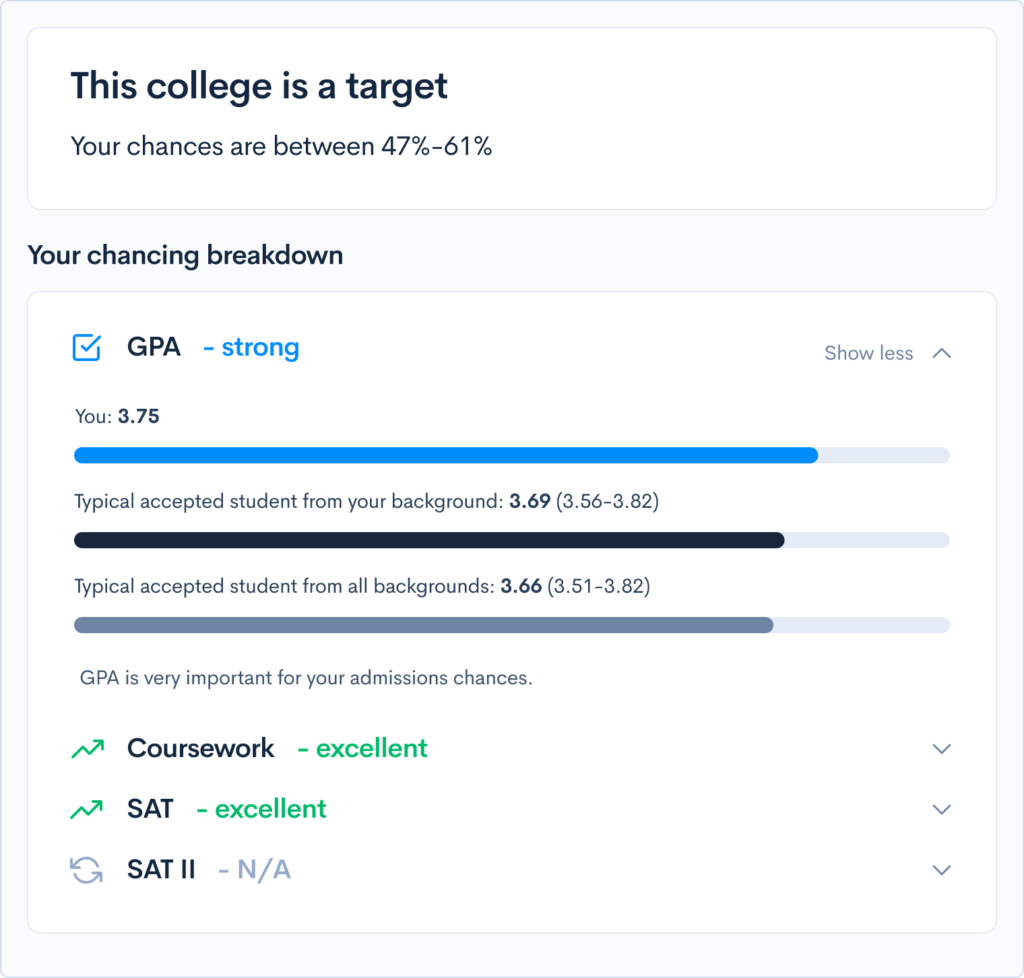How to Calculate UC GPA for College Applications
More than 275,000 students attend one of the ten University of California System (UC System) campuses, which includes some of the most prestigious colleges in the country—in fact, six UC System schools make our list of the 15 best public universities in the U.S. Along with its many programs and traditions, one aspect that distinguishes the UC System from other colleges and universities is the unique GPA calculation they use for admissions. Keep reading to learn more about the UC GPA and how to calculate it for college applications. There are course and GPA requirements for admission to all of the UC System schools. For consideration at a UC school, an applicant must complete a collection of 15 courses known as the “A to G subject requirements.” Those courses are: Letter Subject Requirement A History 2 years B English 4 years C Mathematics 3 years D Science 2 years E Language other than English 2 years (or the equivalent to the second level of high school instruction) F Visual and performing arts 1 year G College-preparatory elective 1 year Students cannot earn a grade lower than a C in their A to G subject requirements. In-state students must earn a minimum 3.0 GPA in their A to G subject requirements, while out-of-state students are required to earn a 3.4 GPA or higher. The UC System doesn’t consider pluses or minuses when calculating GPA—for example an A+, A, and A- all count equally. UC hopefuls must complete 11 of the 15 A to G subject requirements before entering their final year of high school, and only the coursework taken between sophomore and junior year—including the summer after both 9th and 11th grade—are used to calculate your UC GPA. Start by converting the letter grades you earned in your subject requirement courses between summer after 9th grade through summer after 11th grade to points: For each semester of UC honors-level coursework completed with a grade of C or better, an extra point is awarded—grades of CR (credit) and P (pass) do not earn an extra point. The number of extra points you can earn between 10th and 11th grade is capped at eight. For California residents, courses that count as UC honors-level work include: For nonresidents, classes that count as UC honors-level work are a bit more limited. They include: Add up the points earned in your subject requirement courses between summer after 9th grade through summer after 11th along with any honors-level bonus points and divide by the number of letter grades used in the tabulation. The number you get is your UC GPA—don’t round up or down.
Qualifiers such as weighted, unweighted, and capped are all commonly used when discussing UC GPA. While they may cause some confusion, understanding them is relatively simple. Just how important is your UC GPA to your odds of acceptance at a school in the UC System? In the case of California residents, very. Effective beginning 2022, the UC System will implement its “Statewide Guarantee.” The Statewide Guarantee uses the “Statewide Index,” a formula that factors in the number of UC-approved A to G subject coursework completed between 9th and 12th grade, along with UC GPA, to identify the top 9% of high school graduates in the state of California. California residents in the top 9% are guaranteed space at a UC campus, provided there is space available. UC GPA plays a large role in your odds of admission at a UC school (and, if you’re a California resident, is a significant factor in qualifying for the Statewide Guarantee), however, it is just one of many elements the UC System considers when making admission decisions. Even if you earn an astounding UC GPA, GPA alone isn’t enough to secure admission given the selectivity of the UC Schools—this is particularly true for out-of-state applicants. Other characteristics of a strong college profile include content and performance beyond the A to G subject requirement minimums, rigorous coursework including AP and IB classes, strong standardized test scores (if you choose to submit them), and outstanding performances in a particular area. Outside of academics, the schools of the UC System look at extracurricular activities when making admissions decisions. Unique talents—in everything from athletics to music and art—can also figure into admissions decisions. The UC System also looks at the unique situations facing applicants, considering factors like coming from a low-income family, being a first-generation college student, coming from a disadvantaged environment, or having a disability. Wondering about your odds of admission at a UC System school? CollegeVine can help. Our free chancing engine uses a variety of quantitative and qualitative data such as GPA, standardized test scores, and extracurricular activities to predict your odds of acceptance into not only the UC schools, but over 600 colleges and universities across the country. Furthermore, it provides insight into your college profile, highlighting areas to improve. Sign up now for free!What’s Covered:
What is the UC GPA Requirement?
How to Calculate UC GPA for College Applications
Step 1: Convert to Points
Step 2: Account for Honors
Step 3: Make Calculations

UC GPA Weighted, Unweighted, and Capped
UC GPA Statewide Guarantee
How Important is a Good UC GPA?
What Are Your Chances of Acceptance at a UC System School?


